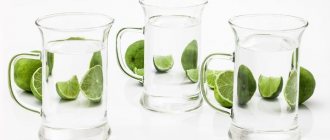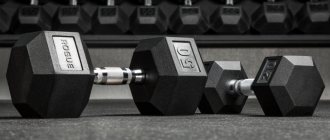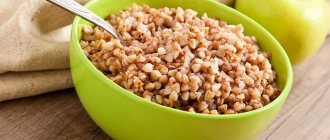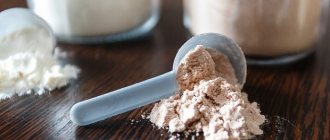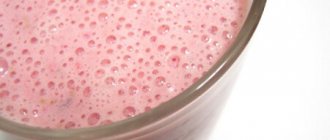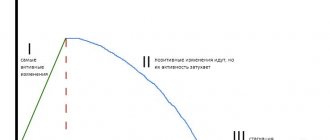Protein is a protein that consists of amino acids. Along with fats and carbohydrates, this is the most important nutrient from food products of animal and plant origin, thanks to which various metabolic processes occur and new cells are synthesized. But in sports nutrition, protein is prepared in the form of a dry powder; one serving (about 30 g) contains 80-95% protein. Such supplements are intended for athletes. And if it’s still the same protein, what happens if you drink protein without training? Let's delve deeper into the topic.
Is it possible to drink protein without training?
First, let's look at protein standards for athletes and those who do not receive any physical activity.
- Protein norm for athletes: 2-3 grams per 1 kg of body weight. This amount is necessary to replenish protein reserves and grow new cells. Of course, for those athletes who are cutting, their protein intake doubles, as the amount of fat and carbohydrates decreases.
- The daily protein requirement of a healthy person is 1-2 grams per kilogram of weight. This amount is enough to support all vital processes in the body. Thus, it is enough for a man weighing 70 kg to consume 70-140 grams of protein per day from food.
When it comes to sports nutrition supplements, just two scoops can meet your daily protein needs. To get this amount of protein from chicken meat, you need to eat from 400 to 800 grams per day or 10-20 eggs with yolk (just as an example). It is from food products (eggs, milk, meat, soy) that protein for athletes is obtained, only in dry form and with a higher protein concentration.
If athletes need such an amount at once, and even want their rapid absorption, which is what some types of protein provide, then the rest do not need it.
But is it possible to gain weight from protein without training - yes, but only excess fat tissue.
Protein without training does not affect muscle growth, its volume is affected by training and nutrition!
Protein shake without training: effect
Protein is an additional supply of amino acids that is useful for the body. It is necessary exclusively for muscles, as it restores connections damaged during exercise and helps them increase in volume. But if there is no training at all, then where does the cocktail go?
Protein consists of several components; we are interested in proteins and carbohydrates. The first ones occupy the largest volume. Their fate is quite simple: part of it is absorbed by the body, and all the excess comes out naturally. The situation with carbohydrates is somewhat different. Usually they provide energy, replacing that which was spent during exercise. If there is no activity at all, then everything goes in reserve. It turns out that from constantly taking protein shakes without activity, you can simply gain weight. Moreover, the increase in body weight will be achieved through fat, and not the desired muscles.
What happens if you drink protein and don't exercise?
Taking protein without training is not contraindicated. You can only replace one of your meals with it, drink it instead of a milkshake, and simply diversify and enrich your diet, if you calculate the daily consumption of KBJU. But you should also consider some of the disadvantages of taking protein without training:
- You need to eat a balanced diet and get a full range of amino acids from food, which you cannot get from protein alone.
- Some types of sports powders are absorbed very quickly. Athletes need this for a speedy recovery after training or sleep, preventing catabolism.
It is important to understand that athletes have a much faster metabolism than untrained people, and muscle volumes or deficits in energy reserves imply faster absorption of substances and in larger quantities.
For people who do not receive stress, everything happens differently. There is a surge in insulin in the blood due to the content of simple carbohydrates in the supplement, this leads to the accumulation of excess fat. In this case, the effect can be compared with eating sweets (to some extent). Although both glucose and lactose are needed by a healthy body, regardless of training.
Therefore, in order not to gain weight due to adipose tissue, it is better to eat protein foods separately , because they do not contain carbohydrates.
What is protein and why should you drink it?
Protein (or protein) is a biologically active substance consisting of structural units - amino acids. It belongs to the macroelements and must be supplied to the body daily through food.
Among natural sources of protein for bodybuilders, animal protein is the most valuable. It is found in meat, fish, poultry, eggs, seafood, milk and dairy products.
Protein of plant origin is also distinguished. The largest amounts are found in some cereals (buckwheat), soybeans, legumes and nuts.
But in bodybuilding this type of protein is neglected, not even taken into account in the calculations of daily consumption. This is due to the incomplete amino acid profile of plant protein.
In addition to natural sources of this nutrient, protein in the form of a sports nutritional supplement has become widespread among bodybuilders and people leading an active lifestyle.
As a rule, it comes in the form of a powder, which must be diluted with liquid (water, milk, juice) before use. Much less common is a ready-made option - in the form of a drink or gel.
Evidence of the effectiveness of protein is scientifically confirmed.
Among the positive aspects of its use:
- Acceleration of muscle anabolism (muscle tissue growth)
- Accelerates recovery after strength training and cardio exercises
- Anti-catabolic properties that prevent the breakdown of muscle tissue
- Participation in the synthesis of polypeptide hormones (somatotropin, insulin, IGF 1)
- Boosting immunity
- Additional energy source
- Healthy skin, nails and hair
- Improving the synthesis of enzymes involved in the body's metabolic processes
This is not a complete list of the benefits of supplementing protein. Every year new data appears on the positive effects of this macronutrient on the body of athletes.
Protein without sports
For the full development of the body, at least one gram of protein per kilogram of weight is necessary. If a person is actively involved in sports, then his dosage increases to at least two grams. What does it mean? You can consume protein without training if your body does not receive the required amount of useful elements from regular food. Otherwise, additional supplementation is considered pointless and sometimes harmful.
For example, you weigh 65 kilograms, which indicates your body’s daily need for 65 grams of protein (without training). If the body gets the required amount of protein from food, then there is no need to take protein powder.
Are there any options?
There are also situations where protein can be beneficial without training at all. In particular, you can and should drink protein when losing weight. Many people are distrustful of such statements, believing that it is impossible to lose weight with the help of sports nutrition. But no. If you build your diet correctly, strictly follow your diet and drink a protein shake, you can achieve impressive results.
The main thing is that supplements do not dominate regular food. At the same time, the amount of carbohydrates and fats must be kept to a minimum. As for protein, the body should receive 1-1.5 grams per kilo of weight. The protein shake itself is best consumed in the evening, and sometimes instead of one of the meals. The advantage of this supplement is that it is filling. One serving is enough to suppress your appetite for a long time even without training, providing the body with all the necessary amino acids.
Reception features
Protein is a protein made up of amino acids. Since it is produced in the form of a dry powder for sports nutrition, one serving (~30 g) contains from 80 to 95% protein.
Protein is a common nutritional supplement among athletes
If we consider the daily protein requirement, then it is worth dividing it as follows:
- The norm for athletes. Per 1 kg of weight there should be 2-3 grams of protein per day. That is, if your body weight is 90 kg, the daily protein intake is 180-270 grams. A separate calculation is made for athletes who are “cutting”: for them, the protein norm is doubled by reducing the amount of carbohydrates and fats.
- The norm for a person without additional physical activity. A healthy person should consume 1-2 grams of protein per kilogram of their weight. That is, with a body weight of 70 kg, you need to consume 70-140 grams of protein from food.
To get the required portion of protein from regular food, you need to eat 400-800 grams of chicken meat or 10-20 eggs per day. But if you supplement your diet with sports supplements, then a protein shake made from just 2 measuring cups of powder will fill your daily requirement.
It is best to mix the powder with milk, water or juice when preparing a protein shake. In this case, the volume of liquid does not matter, which allows you to adjust the concentration to your taste.
The main rule is not to use hot water: because of it, the protein will lose its properties and the cocktail will curdle.
The resulting cocktail will be an excellent snack between main meals; it is advisable to drink it in 3-5 approaches (if you drink the entire volume at one time, it will not be absorbed in the body). On training days, you can drink a protein shake immediately after training, and on rest days, before dinner.
A protein shake is a great snack between meals.
When choosing a liquid protein shake base, be sure to pay attention to its composition: if it is low-carb or isolate, then milk makes an excellent base, but if it is high in carbohydrates, it is recommended to use water to maintain your daily calorie level. It is also possible to make a cocktail based on kefir or juice, but such a recipe is rare and depends on individual taste preferences. Experiment and you can find your perfect recipe.
It is also worth noting that it is not advisable to drink protein during meals, since protein is absorbed in minimal quantities.
During a period of complete rest from training
Another question is what will happen if you drink protein without training. That is, when you decide to take a break from strength training or don’t exercise at all.
It is known that for a man not engaged in heavy physical labor or sports, the recommended medical daily protein intake is 0.8 grams per 1 kg of body weight.
This is half as much as when you work out in the gym.
This amount can be gained using regular food.
Many people know, but for some reason they forget that protein is not only a plastic material for the body, but also an additional source of energy - 1 gram contains 4 kilocalories (by the way, like carbohydrates).
If you consume protein powder in large quantities without training, you may end up with a calorie surplus.
If you are lucky with your metabolism and it is naturally fast (as, for example, in ectomorphs), then the excess protein will simply be excreted. It will be a waste of money and an extra burden on the gastrointestinal tract.
If you have a mesomorphic (athletic) or endomorphic (prone to overweight) body type, you may accumulate fat.
It doesn’t matter which macronutrient is in excess - carbohydrate, fat or protein. If you create a calorie surplus, it is guaranteed to lead to fat gain.
The exception when you can drink protein powder without training is if you don’t have enough of its daily requirement. For example, in the case of vegans, vegetarians, etc.


